常见的虚拟语气句型
英语-虚拟语气
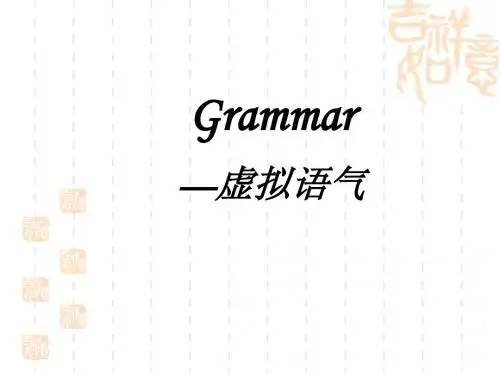
Some Exercise
were 1. Even if he _______(be) here, he couldn’t solve the problem. were 2. He is playing the piano as if he _______ (be) Chopin. 3. He looks so happy as if hehad passed ________(pass) the exam already.
Some Exercise
had married 1. He would rather her___________(marry) a dog last year. didn’t go 2. I would rather you __________ (not go) there. stayed 3. I’d rather you ___________(stay) at home all day today. 4. I’d sooner you hadn’t done (do) yet. __________
5. ห้องสมุดไป่ตู้e insisted (坚决认为) that Tom broke _____(brake) the glass. was 6. His face suggested (表明) that he _____ angry.(be)
以lest, for fear that, in case引出从句
Some Exercise
1. He is not a pilot, but he wishes were he______ (be). had met 2. I wish I ___________(meet)him yesterday. would be 3. I wish it __________(be) fine tomorrow. had got up 4. If only I ___________(get up) early yesterday.
虚拟语气的八种情况
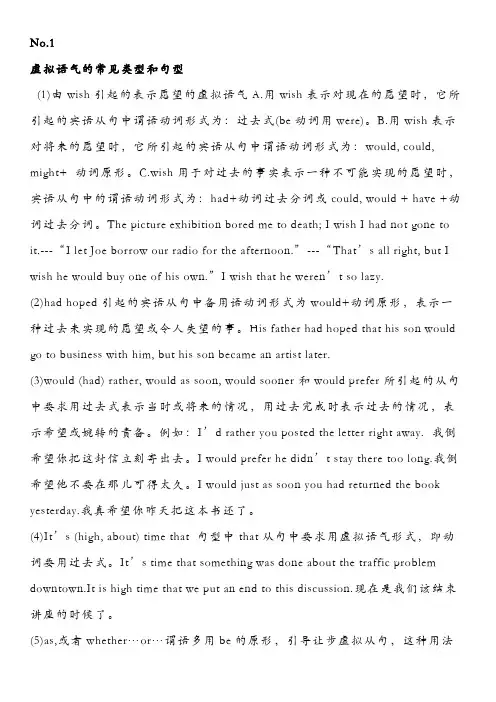
No.1虚拟语气的常见类型和句型(1)由wish引起的表示愿望的虚拟语气A.用wish表示对现在的愿望时,它所引起的宾语从句中谓语动词形式为:过去式(be动词用were)。
B.用wish表示对将来的愿望时,它所引起的宾语从句中谓语动词形式为:would, could, might+ 动词原形。
C.wish用于对过去的事实表示一种不可能实现的愿望时,宾语从句中的谓语动词形式为:had+动词过去分词或could, would + have +动词过去分词。
The picture exhibition bored me to death; I wish I had not gone to it.---“I let Joe borrow our radio for the afternoon.”---“That’s all right, but I wish he would buy one of his own.”I wish that he weren’t so lazy.(2)had hoped引起的宾语从句中备用语动词形式为would+动词原形,表示一种过去未实现的愿望或令人失望的事。
His father had hoped that his son would go to business with him, but his son became an artist later.(3)would (had) rather, would as soon, would sooner和would prefer所引起的从句中要求用过去式表示当时或将来的情况,用过去完成时表示过去的情况,表示希望或婉转的责备。
例如:I’d rather you posted the letter right away. 我倒希望你把这封信立刻寄出去。
I would prefer he didn’t stay there too long.我倒希望他不要在那儿可得太久。
虚拟语气十大句型
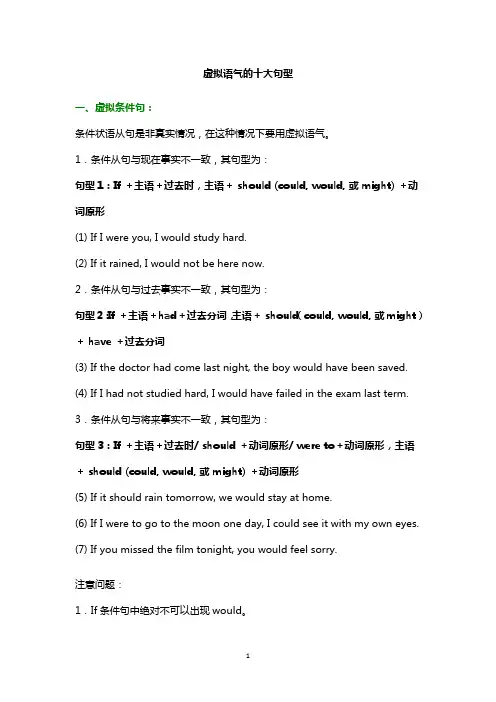
虚拟语气的十大句型一、虚拟条件句:条件状语从句是非真实情况,在这种情况下要用虚拟语气。
1.条件从句与现在事实不一致,其句型为:句型1:If +主语+过去时,主语+ should (could, would, 或might) +动词原形(1) If I were you, I would study hard.(2) If it rained, I would not be here now.2.条件从句与过去事实不一致,其句型为:句型2:If +主语+had+过去分词,主语+ should(could, would, 或might)+ have +过去分词(3) If the doctor had come last night, the boy would have been saved.(4) If I had not studied hard, I would have failed in the exam last term. 3.条件从句与将来事实不一致,其句型为:句型3:If +主语+过去时/ should +动词原形/ were to+动词原形,主语+ should (could, would, 或might) +动词原形(5) If it should rain tomorrow, we would stay at home.(6) If I were to go to the moon one day, I could see it with my own eyes.(7) If you missed the film tonight, you would feel sorry.注意问题:1.If条件句中绝对不可以出现would。
2.根据句中的时间状语,有时可能出现“混合虚拟”的情况,即主句可能是现在的情况,条件句也许是发生在过去的情况,但都要遵守上述句型。
如:(8) If you had studied hard before, you would be a college student now and you would graduate from a college in four years’ time.3.条件句中如果出现were, had, should可省去if,将主语与这些词倒装。
英语虚拟语气的用法和诀窍

虚拟语气15种句型
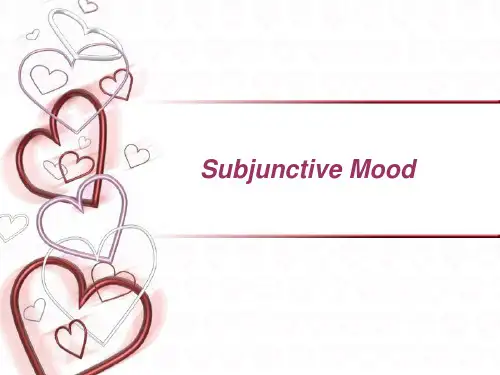
3.as if / as though后的表语或状语从句 (与wish相同)
含义 动 词 形 式
例句
现在 did / were
He looks as if he knew the little girl.
过去 Have done
It appeared as if nothing had
happened.
5.动词形式为(should)+do 的虚拟
2. It’s + adj.+that 的主语从句 (adj: necessary / essential/
important / natural / strange / possible / impossible
eg. It is important that we should attend the meeting.
• 对过去的猜测 • 肯定 must have done • 否定 can / could not have done • 可能 may / might have done
• 本应该做(实际没有做,有责备意思) • should have done • shouldn’t have done • 本来有必要作(实际没有做,不含责
desire 命令:order / command/ 坚持:insist 不管是动词还是名词,不管是主动还是被动
,不管是引导主语从句, 宾语从句, 表语 从句还是同位语从句, 都要用(should) do
5.动词形式为(should)+do 的虚拟
• My suggestion is that we should listen to his opinion first.
It is time that we stopped work and went home.
虚拟语气分三种情况来掌握
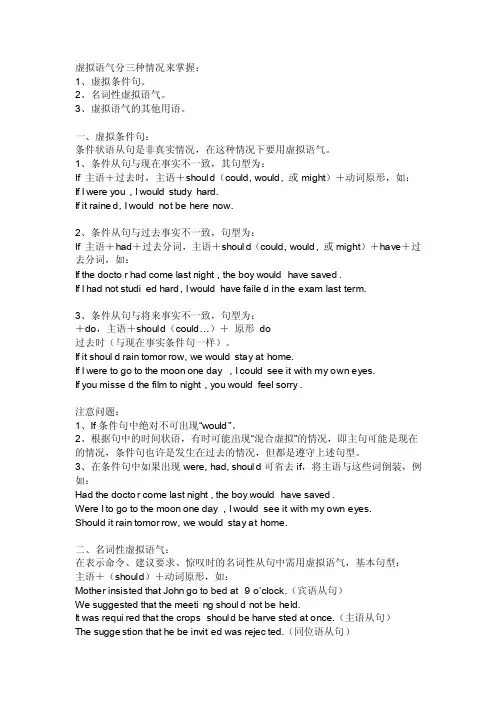
虚拟语气分三种情况来掌握:1、虚拟条件句。
2、名词性虚拟语气。
3、虚拟语气的其他用语。
一、虚拟条件句:条件状语从句是非真实情况,在这种情况下要用虚拟语气。
1、条件从句与现在事实不一致,其句型为:If 主语+过去时,主语+should(could, would,或might)+动词原形,如:If I were you, I wouldstudyhard.If it rained, I wouldnot be here now.2、条件从句与过去事实不一致,句型为:If 主语+had+过去分词,主语+should(could, would,或might)+have+过去分词,如:If the doctor had come last night, the boy wouldhave saved.If I had not studie d hard, I wouldhave failed in the exam last term.3、条件从句与将来事实不一致,句型为:+do,主语+should(could…)+原形do过去时(与现在事实条件句一样)。
If it should rain tomorr ow, we wouldstay at home.If I were to go to the moon one day, I couldsee it with my own eyes.If you missed the film to night, you wouldfeel sorry.注意问题:1、If条件句中绝对不可出现“would”。
2、根据句中的时间状语,有时可能出现“混合虚拟”的情况,即主句可能是现在的情况,条件句也许是发生在过去的情况,但都是遵守上述句型。
3、在条件句中如果出现we re, had, should可省去if,将主语与这些词倒装,例如:Had the doctor come last night, the boy wouldhave saved.Were I to go to the moon one day, I wouldsee it with my own eyes.Should it rain tomorr ow, we wouldstay at home.二、名词性虚拟语气:在表示命令、建议要求、惊叹时的名词性从句中需用虚拟语气,基本句型:主语+(should)+动词原形,如:Mother insist ed that John go to bed at 9 o’clock.(宾语从句)We sugges ted that the meetin g should not be held.It was requir ed that the cropsshould be harves ted at once.(主语从句)The sugges tionthat he be invite d was reject ed.(同位语从句)That is theirdemand that theirwagesbe increa sed.(表语从句)注意:在这种句子中绝不出现“would”“must”“could”等。
高中英语虚拟语气句型
常见的虚拟语气句型1.if条件句条件状语从句可分为真实条件句,即条件满足,事实就发生的情况;和非真实条件句,即与事实相反或难以实现的假设情况。
虚拟语气的基本句型,即是这If I had got up early, I wouldn’t have been late.If I were to do it, I should do it at once.【说明】①在非正式英语中,条件从句中的第一、第三人称单数主语后可用was代替were。
If I was you, I would accept the invitation.②主句中的would可用于各种人称,而should只用于第一人称。
③在主句中也可用情态动词could,might代替would,should。
If I had had enough time, I might have done it better.④条件从句中的谓语动词含有were,had,should时,可以省略从属连接词if,然后采用倒装结构,把were,had,should移到主语前面。
Should you pass this way, do drop in for a visit.= If you should pass this way,……Had I known it, I wouldn’t had made such a silly mistake.= If I had known it,……Were it left to me to decide whether I should have a job immediately or go on to study at college, I wouldn’t hesitate a moment to choose the latter.= If it were left to me to decide……..⑤在同一个句子中不能一部分表示真实条件,另一部分表示非真实条件。
虚拟语气15种句型总结
C.didn’t hurt; would go
D.didn’t hurt; would have gone
17 21 19
2.wish 后的宾语从句 = if only
含义
动词形式
对现状 表达愿望 Did / were
对过去表示 遗憾/后悔
Had done
例句
I wish I had a little lab of my own.
备意思)
• Need have done • Needn't have done
Practice
1. If I _k_n_e_w__ (know) her address, I would write to her. 2. What would you have done if you _h_a_d__m__is_s_e_d(miss) the train? 3. If he h__a_d_n_o_t_b__ee_n_ il(lnot be ill ), he would have done something. snows 4. If itw__er_e__to__/s_h_o_u_l_d__sn_o_w__/_s_n_o_w_e_d(snow) tomorrow, we _sh__o_u_ld__g_e_t_u_p_(get up) early.
• My suggestion that we should listen to his opinion first is being discussed.
• 注意当insist—硬说,suggest—表明, 不能有虚拟语气。
5.动词形式为(should)+do 的虚拟
2. It’s + adj.+that 的主语从句 (adj: necessary / essential/
虚拟语气的用法与句型
虚拟语气的用法与句型虚拟语气是指在句子中表达一种假设、愿望、建议、命令等非真实情况的语气。
它在表达的内容上与现实相悖,用于描述与实际情况相反或与现在事实相反的假想情况。
虚拟语气在汉语中分为虚拟条件和虚拟假设两种情况。
本文将详细介绍虚拟语气的用法和常见句型。
一、表示假设的虚拟条件句型1. 如果引导的条件句条件句使用“如果+主语+动词”的结构,表示与实际情况相反的假设。
举例:如果我会飞,我就飞到天空中。
如果你能去,我们就一起去旅行。
如果明天下雨,我就不去跑步了。
2. 要是引导的条件句条件句使用“要是+主语+动词”的结构,表示与实际情况相反的假设。
举例:要是你在这里,我就不会感到孤单。
要是他努力学习,他就可以考上大学。
要是明天放假,我就会去看电影。
3. 假如引导的条件句条件句使用“假如+主语+动词”的结构,表示与实际情况相反的假设。
举例:假如我是你,我就不会这样选择。
假如我有足够的时间,我就会旅行。
假如天气好,我们就可以去海边玩。
二、表示愿望的虚拟条件句型1. 祈使句+“但愿(希望)”句型使用祈使句来表达对未来情况的愿望,后接“但愿(希望)”引导的句子,表示非真实情况的愿望。
举例:多带雨伞,但愿今天不下雨。
早点回家,但愿家里没人。
努力学习,但愿能考好成绩。
2. 希望/愿望+“(能)+动词原形”使用希望或愿望来表达对未来情况的期望,后接能否+动词原形,表示非真实情况的愿望。
举例:我希望明天不下雨。
我希望他能来参加我的生日派对。
我希望你明天能早点到公司。
三、表达建议的虚拟条件句型1. 建议/要求/命令+“(应该)+动词原形”使用建议、要求或命令来表达对他人的建议,后接“应该”引导的句子,表示非真实情况的建议。
举例:你应该多锻炼身体,这样会更健康。
你应该早点睡觉,这样明天才能精神饱满。
上班迟到是不对的,你应该注意时间。
2. 要是/如果+动词过去式使用要是或如果来引导一个非真实情况的条件句,表示一种建议或建议的情感色彩。
虚拟语气
虚拟语气1. without1)当表示“若没有”时,如果谈论的是一种与事实相反的假设,要用虚拟语气,此时,和but for用法相同:Eg. Life would be quiter without the telephone.2)如果without谈论的只是一种普通的假设,并不强调与既定事实相反,则不必用虚拟语气:Eg. Can you see without your glasses. 如果不戴眼镜,你能看见吗?3)if it weren’t for与if it hadn’t been for这两个也是常见的虚拟句型,表示“若不是有,要不是有”,与but for和without同义:Eg. If it wasn’t for the children, we wouldn’t have anything to talk about.Were it not for this misfortune, he might never have been forced into the business of grinding out novels to support his family. 如果不是因为这一不幸变故,他可能永远不会被迫从事创作小说养家糊口。
注:一般,if it weren’t for用于谈论现在的情况,if it hadn’t been for用于谈论过去的情况,但有时if it weren’t for也可用于谈论过去的情况。
2. 常见的介词短语:in the absence of(如果没有),were it not for(要是没有),but that (假设……不)等:Eg. In the absence of gravitity, there would be no air around the earth.3. 虚拟语气用在would rather,had rather,would sooner(宁愿,宁可),had better,had best (最好),would have句型中,后面如果是动词,后接原形动词。
- 1、下载文档前请自行甄别文档内容的完整性,平台不提供额外的编辑、内容补充、找答案等附加服务。
- 2、"仅部分预览"的文档,不可在线预览部分如存在完整性等问题,可反馈申请退款(可完整预览的文档不适用该条件!)。
- 3、如文档侵犯您的权益,请联系客服反馈,我们会尽快为您处理(人工客服工作时间:9:00-18:30)。
常见的虚拟语气句型
一、虚拟语气用于非真实条件句中
1.与现在事实相反的虚拟语气形式
If+主语+动词的过去式(be要用were)……, 主句主语+would(或should, could, might)+动词原形。
2.与过去事实相反的虚拟语气形式
If+主语+had+过去分词……, 主句主语+would(或should, could, might)+have+过去分词。
3.与将来事实相反的虚拟语气形式
If+主语+动词的过去式(或were to +动词原形, 或should +动词原形)……, 主句主语+would(或should, could, might)+动词原形。
二、虚拟语气的其它句型
1虚拟语气用在动词wish带的宾语从句中, 宾语从句的谓语动词形式为:
①谓语动词用过去式(be用were)表示现在的情况。
例如: I wish I didn't have a cold. 但愿我没有感冒。
②谓语动词用过去完成式表示过去的情况。
例如: I wish I had seen you yesterday.
③谓语动词用would(或could, might)+动词原形表示将来的情况。
例如: I wish you could come tomorrow. 但愿你明天会来。
注: as if(=as though)引导的从句和if only后面所跟的句子也要用虚拟语气, 其形式和动词wish所带的宾语从句的形式相同。
例如: When a pencil is partly in a glass of water, it looks as if it were broken.
If only I had followed his advice. 若是我听了他的劝告就好了。
2用介词短语(without..., but for... )、副词(otherwise)表示某种假设的情况, 相当于if引导的虚拟条件句。
例如: Without electricity human life would be quite different today.
3虚拟语气用在It +be +important(necessary, strange, natural)+that clause句型中, that clause的谓语动词应为“(should +)动词原形”。
例如: It is necessary that he be sent to the hospital at once.
4虚拟语气用在It +be +time +that clause句型中, that clause的谓语动词应为“动词的过去式(be用were)或should +动词原形”。
例如: It is time that he went(should go)to bed. 他睡觉的时间到了。
5. 虚拟语气用在order, ask, suggest(建议), demand, request, insist(坚持要)等动词后面的宾语从句中, 宾语从句的谓语动词应为“(should +)动词原形”。
例如: He suggested that she start/ should start at once.
6. 虚拟语气用在advice, idea, order, plan, suggestion, demand, proposal等名词后面的表语从句或同位语从句中, 从句的谓语动词应为“(should +)动词原形”。
例如: My suggestion is that you should hold the meeting next Sunday.
The teacher gave orders that the work be finished / should be finished before 4 o'clock.
7. 虚拟语气用在It +be +suggested(ordered, demanded, requested... )+that clause句型中, that clause的谓语动词应为“(should +)动词原形”。
例如: It is suggested that we(should)start the work at once. 有人建议我们立即开始工作。
8. 虚拟语气用在would rather后面的从句中。
用过去式(be用were)表示现在或将来的情况; 用过去完成式表示过去的情况。
例如: I would rather you went next Sunday. 我愿你下星期天去。
I would rather you hadn't done that. 我真希望你没做那件事。
